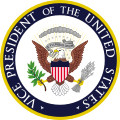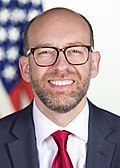Top Qs
Timeline
Chat
Perspective
Second cabinet of Donald Trump
From Wikipedia, the free encyclopedia
Remove ads
Donald Trump assumed office as the 47th president of the United States on January 20, 2025. The president has the legal authority to nominate members of his cabinet to the United States Senate for confirmation under the Appointments Clause of the United States Constitution.
Remove ads
Cabinet
Summarize
Perspective
All permanent members of the Cabinet of the United States as heads of executive departments require the advice and consent of the United States Senate following appointment by the president before taking office. The vice presidency is exceptional in that the position requires an election to office pursuant to the United States Constitution. The president may also designate heads of other agencies and non-Senate-confirmed members of the Executive Office of the President as cabinet-level members of the cabinet. The cabinet meets with the president in the Cabinet Room, a room adjacent to the Oval Office.
As the Republican Party controls the Senate, it is expected that all of Trump's designates will be confirmed with little contest.[1] However, some nominees have been met with criticism by a few Senate Republicans.[2]
Trump's cabinet choices were described by Business Insider and Reuters as valuing personal loyalty over relevant experience,[3][4] and for having a range of conflicting ideologies and "eclectic personalities".[5][6] It was also described as the wealthiest administration in modern history, with over 13 billionaires chosen to take government posts.[7][8] Trump officials and Elon Musk threatened to fund primary challengers in upcoming elections against Republican senators who did not vote for Trump's nominees.[9][10] He nominated or appointed 23 former Fox News employees to his administration.[11]
On November 12, 2024, President-elect Trump announced that his administration would establish a Department of Government Efficiency (DOGE).[12] Despite the name, DOGE is not a federal executive department, since official departments require congressional approval, but a component of the Executive Office of the President.[13][14][15] Elon Musk, a then senior advisor to the President, played a key role in DOGE’s operations before leaving the government in May 2025, as his special employee government contract had ended. Shortly after Musk left the government, Trump and Musk exchanged a public feud over the nearly $3 trillion deficit projected to result from the One Big Beautiful Bill.[16][17] The following have been named as cabinet appointees by the President of the United States.
Confirmation process
Below is a list of confirmations for or withdrawals from Cabinet positions, Cabinet-level positions, and other significant positions that were approved through the Senate from January 2025 onwards, by a recorded roll-call vote, rather than by a voice vote.
The accessibility of this article is in question. The specific issue is: Text is way too small to be legible. Relevant discussion may be found on the talk page. |

Image from Second cabinet of Donald Trump timeline
Confirmation votes
Committee process
Remove ads
Elected officials
Summarize
Perspective
President
Donald Trump defeated the incumbent vice president and Democratic nominee, Kamala Harris, in the 2024 presidential election, receiving 312 electoral votes compared to Harris's 226; he won every swing state in addition to holding on to all of the states that he won in 2020.[16][18] The formal certification of the results took place on January 6, 2025. He assumed office on January 20, 2025.
Vice President
The vice president is the only cabinet member to be elected to the position. The vice president does not require Senate confirmation, and does not serve at the pleasure of the president. There were dozens of potential running mates for Trump who received media speculation. Trump's eventual pick of Senator JD Vance (R-OH) was officially announced on July 15, 2024, and confirmed by acclamation via parliamentary procedure amongst delegates to the 2024 Republican National Convention on July 15, 2024.
United States senator JD Vance (R-OH) was elected Vice President of the United States on November 5, 2024. He received 312 electoral votes while the governor of Minnesota, Tim Walz, received 226. The formal certification of the results took place on January 6, 2025. He assumed office on January 20, 2025. Vance is the third-youngest vice president in U.S. history.
Remove ads
Selected candidates for Cabinet positions
Summarize
Perspective
The following cabinet positions are listed in order of their creation (also used as the basis for the United States presidential line of succession).
Secretary of State
A nomination for Secretary of State is reviewed during hearings held by the members of the Foreign Relations Committee, then presented to the full Senate for a vote. Senator Marco Rubio from Florida was announced as President-elect Trump's nominee for the position on November 13, 2024.[20] He was confirmed 99–0 by the Senate on January 20, 2025, and sworn in the next day.
Secretary of the Treasury
A nomination for Secretary of the Treasury is reviewed during hearings held by the members of the Finance Committee, then presented to the full Senate for a vote. Investor and hedge fund manager Scott Bessent from South Carolina, founder of the global macro investment firm Key Square Group, was announced as Trump's nominee for the position on November 22, 2024.[21] He was confirmed 68–29 by the Senate on January 27, 2025,[22] and sworn in the next day.
Secretary of Defense
A nomination for Secretary of Defense is reviewed during hearings held by the members of the Armed Services Committee, then presented to the full Senate for a vote. Major Pete Hegseth from Tennessee, a Fox News political commentator, was announced as Trump's nominee for the position on November 12, 2024.[23] He was confirmed 51–50 by the Senate on January 24, 2025, and sworn in the next day.
Attorney General
A nomination for Attorney General is reviewed during hearings held by the members of the Judiciary Committee, then presented to the full Senate for a vote. On November 21, 2024, President-elect Trump selected former state attorney general Pam Bondi of Florida as his new nominee for the position.[26] She was confirmed 54–46 by the Senate on February 4, 2025, and sworn in the next day.
Failed nomination of Matt Gaetz
On November 13, 2024, Representative Matt Gaetz was selected to be attorney general,[27] though Gaetz withdrew his name on November 21, 2024[28] after many Senate Republicans stated that he did not have enough votes to be confirmed.[29]
Secretary of the Interior
A nomination for Secretary of the Interior is reviewed during hearings held by the members of the Energy and Natural Resources Committee, then presented to the full Senate for a vote. Governor Doug Burgum of North Dakota was announced as Trump's nominee for the position on November 15, 2024.[30] He was confirmed 79–18 by the Senate on January 30, 2025, and sworn in the next day.
Secretary of Agriculture
A nomination for Secretary of Agriculture is reviewed during hearings held by the members of the Agriculture, Nutrition, and Forestry Committee, then presented to the full Senate for a vote. Former acting DPC director Brooke Rollins from Texas was announced as Trump's nominee for the position on November 23, 2024. She was confirmed 72–28 by the Senate on February 13, 2025, and sworn in the same day.
Secretary of Commerce
A nomination for Secretary of Commerce is reviewed during hearings held by the members of the Commerce, Science, and Transportation Committee, then presented to the full Senate for a vote. Businessman Howard Lutnick from New York, Chairman, CEO & President of Cantor Fitzgerald, was announced as Trump's nominee for the position on November 19, 2024.[35] He was confirmed 51–45 by the Senate on February 18, 2025, and sworn in on February 21, 2025.
Secretary of Labor
A nomination for Secretary of Labor is reviewed during hearings held by the members of the Health, Education, Labor, and Pensions Committee, then presented to the full Senate for a vote. On November 22, 2024, President-elect Trump selected Representative Lori Chavez-DeRemer from Oregon as his nominee for Labor Secretary. She was confirmed 67–32 by the Senate on March 10, 2025, and sworn in the next day.
Secretary of Health and Human Services
Although historically the nominee also holds meetings with the Health, Education, Labor, and Pensions Committee, officially a nomination for Secretary of Health and Human Services is reviewed during hearings held by the members of the United States Senate Committee on Finance, then presented to the full Senate for a vote. 2024 independent presidential candidate Robert F. Kennedy Jr. from California was announced as Trump's nominee for the position on November 14, 2024.[39] He was confirmed 52–48 by the Senate on February 13, 2025, and sworn in the same day.
Secretary of Housing and Urban Development
A nomination for Secretary of Housing and Urban Development is reviewed during hearings held by the members of the Banking, Housing, and Urban Affairs Committee, then presented to the full Senate for a vote. The president-elect announced the nomination of former state representative Scott Turner from Texas on November 22, 2024. He was confirmed 55–44 by the Senate on February 5, 2025, and sworn in the same day.
Secretary of Transportation
A nomination for Secretary of Transportation is reviewed during hearings held by the members of the Commerce, Science, and Transportation Committee, and then presented to the full Senate for a vote. Former representative and former prosecutor Sean Duffy from Wisconsin was announced as Trump's nominee for the position on November 18, 2024.[43] Elon Musk and other Silicon Valley executives had encouraged Trump to pick Emil Michael for the role.[44] He was confirmed 77–22 by the Senate on January 28, 2025, and sworn in the same day.[45]
Secretary of Energy
The nomination of a secretary-designate is reviewed during hearings held by the members of the Energy and Natural Resources Committee, then presented to the full Senate for a vote. Engineer and businessman Chris Wright from Colorado, Chairman, CEO, and Founder of Liberty Energy, was announced as Trump's nominee for the position on November 15, 2024.[48] He was confirmed 59–38 by the Senate on February 3, 2025, and sworn in the same day.
Secretary of Education
A nomination for Secretary of Education is reviewed during hearings held by the members of the Health, Education, Labor, and Pensions Committee, then presented to the full Senate for a vote. Former SBA administrator Linda McMahon from Connecticut was announced as Trump's nominee for the position on November 19, 2024.[52] She was confirmed 51–45 by the Senate on March 3, 2025, and sworn in the same day.
Secretary of Veterans Affairs
A nomination for Secretary of Veterans Affairs is reviewed during hearings held by the members of the Veterans' Affairs Committee, then presented to the full Senate for a vote. Air Force colonel and former representative Doug Collins from Georgia was announced as Trump's nominee for the position on November 14, 2024.[55] He was confirmed 77–23 by the Senate on February 4, 2025, and sworn in the next day.
Secretary of Homeland Security
A nomination for Secretary of Homeland Security is reviewed during hearings held by the members of the Homeland Security and Governmental Affairs Committee, then presented to the full Senate for a vote. Air Force Auxiliary lieutenant colonel and Governor Kristi Noem of South Dakota was announced as Trump's nominee for the position on November 12, 2024.[57] She was confirmed by the Senate 59–34 on January 25, 2025, and sworn in the same day.
Remove ads
Selected candidates for Cabinet-level positions
Summarize
Perspective
Cabinet-level officials have positions that are considered to be of Cabinet-level, but which are not heads of the executive departments. The exact positions that are considered to be Cabinet-level vary with each administration.
Administrator of the Environmental Protection Agency
In November 2024, President-elect Trump selected Army lieutenant colonel and former representative Lee Zeldin from New York as EPA administrator. He was confirmed 56–42 by the Senate on January 29, 2025, and sworn in the same day.[59]
- Environment and Public Works Committee is responsible for holding a hearing to advance the nomination for a full Senate vote.
Director of the Office of Management and Budget
In November 2024, President-elect Trump selected former Office of Management and Budget director Russell Vought from Virginia as OMB director. He was confirmed 53–47 by the Senate on February 6, 2025, and sworn in the next day.
- Budget Committee is responsible for holding a hearing to advance the nomination for a full Senate vote.
Director of National Intelligence
The director of national intelligence was first elevated to Cabinet-level status by Trump in February 2017, during his first administration. In November 2024, President-elect Trump selected Army lieutenant colonel and former U.S. representative Tulsi Gabbard from Hawaii to serve as his DNI. She was confirmed 52–48 by the Senate on February 12, 2025, and sworn in the same day.
- Intelligence Committee is responsible for holding a hearing to advance the nomination for a full Senate vote.
Director of the Central Intelligence Agency
The director of the Central Intelligence Agency was first elevated to Cabinet-level status by Trump in February 2017, during his first administration. This ended with the beginning of the Biden administration.[63] In July 2023, the D/CIA was once again elevated to Cabinet-level status by the Biden administration.[64] In November 2024, President-elect Trump selected former DNI and former U.S. representative John Ratcliffe from Texas to serve as CIA director. He was confirmed 74–25 by the Senate on January 23, 2025, and sworn in the same day.
- Intelligence Committee is responsible for holding a hearing to advance the nomination for a full Senate vote.
U.S. Trade Representative
The U.S. trade representative has been a Cabinet-level member since 1974, the beginning of Gerald Ford's administration. President-elect Trump selected former USTR chief of staff Jamieson Greer from Maryland to be nominated for the position on November 26, 2024. He was confirmed by the Senate 56–43 on February 26, 2025, and sworn in the next day.
- Finance Committee is responsible for holding a hearing to advance the nomination for a full Senate vote.
Ambassador to the United Nations
The U.N. ambassador was previously in the Cabinet from 1953 to 1989, 1993 to 2001, and 2009 to 2018. Trump nominated Waltz on May 1, 2025.
- Foreign Relations Committee is responsible for holding a hearing to advance the nomination for a full Senate vote.
Withdrawn nomination of Elise Stefanik
In November 2024, President-elect Trump selected Representative Elise Stefanik from New York as his U.N. ambassador. Trump withdrew the nomination on March 27, 2025.[70]
Administrator of the Small Business Administration
The administrator of the Small Business Administration has been a Cabinet-level member since 2012, the middle of Barack Obama's administration.[71] It was previously a Cabinet-level member during the Clinton administration.[72][73] President-elect Trump nominated former U.S. Senator Kelly Loeffler from Georgia to be Administrator of the Small Business Administration on December 4, 2024. She was confirmed by the Senate 52–46 on February 19, 2025, and sworn in the next day.
- Small Business and Entrepreneurship Committee is responsible for holding a hearing to advance the nomination for a full Senate vote.
White House chief of staff
The White House chief of staff has traditionally been the highest-ranking staff employee of the White House. The responsibilities of the chief of staff are both managerial and advisory over the president's official business. The chief of staff is appointed by and serves at the pleasure of the president; it does not require Senate confirmation. On November 7, 2024, Trump announced Susie Wiles from Florida as his choice for his chief of staff, having served as his 2024 campaign co-chair. Wiles is the first woman to hold the position.[75]
Remove ads
Acting Cabinet officials
Summarize
Perspective
Because cabinet members must be confirmed by the Senate, acting officials are typically appointed for the period before the Senate votes, in accordance with the Federal Vacancies Reform Act of 1998. For cabinet positions, only people who already actively hold a position confirmed by the Senate at the end of the previous administration are eligible, and they retain that position while they are detailed to the acting position.[76] Normally, a senior employee of the same executive agency who is equivalent to a GS-15 or above on the federal pay scale would also be eligible, but this is believed to be unconstitutional in the case of secretaries of the federal executive departments, although this has not been tested in court.[77]
Remove ads
Views of nominees expressed in nomination hearings
This section may contain an excessive amount of intricate detail that may only interest a particular audience. (June 2025) |
The nominees for the various cabinet positions answered questions in the respective Senate committee for the position that they were nominated for. Some nominees shared views on specific issues, while others differed on these views.
FISA Section 702
CIA director John Ratcliffe and FBI director Kash Patel both stated in their respective Senate nomination hearings that obtaining a search warrant for an investigation under Section 702 of the Foreign Intelligence Surveillance Act (FISA) may be nearly impossible in situations where information is needed immediately, as might be in a hostage rescue situation or similar type of issues needing information moment by moment.[120] In contrast, director of national intelligence nominee Tulsi Gabbard spent a large part of her time in her nomination hearing emphasizing the need for privacy of U.S. citizens when Section 702 is applied.[121] Essentially, § 702(b) of the FISA Amendments Act of 2008 prohibits intentional data gathering of a U.S. citizen in the process of an investigation of an issue overseas.[122]
Remove ads
See also
Notes
- Vice President JD Vance provided the tie-breaking vote.
- Vice President JD Vance provided the tie-breaking vote.
Remove ads
References
Wikiwand - on
Seamless Wikipedia browsing. On steroids.
Remove ads








































































